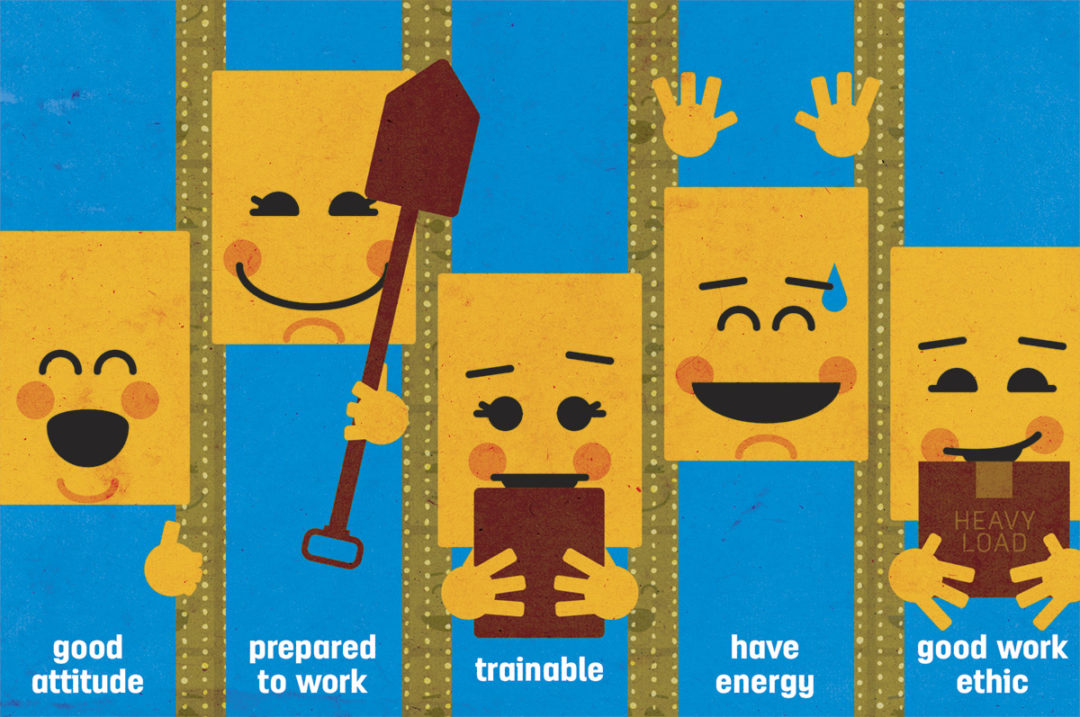Many business leaders and managers complain that they can teach new employees how to do all the tasks required for the job, but too often prospective employees lack the character and attitude necessary to fit their company culture.
Here are a few desirable traits requiring no talent, skills, experience or education to be a great employee, whether they are a family member or a hired employee.
The desirable traits
Being on time is perhaps the easiest trait, one of the most essential parts of the job and one that any employee has complete control over. There are certainly times when issues beyond the employee’s control occur, but dedicated employees will have backup plans, keeping these times limited and the effect of their tardiness minimized. Even employees who are late to work one day can correct the problem the next day and ensure it rarely happens again.
A person’s attitude is a choice they make every morning when they wake up, regardless of circumstances. If a paraplegic, someone fighting cancer or anyone with a severe physical disability can wake up in the morning and choose to have a great day, then just about anyone can make that choice every single day.
Effort is measurable and is an indication of a person’s desire to do an appropriate level of work. Even when a person lacks the experience, education or skills needed to do a job, putting in maximum effort will show they care about their work and are willing to put in a full day. Good employees realize they can choose their level of effort regardless of the effort provided by their co-workers.
For many employers, simply showing the boss you are willing to put in the required level of effort to complete the job on time and to acceptable standards is all the evidence they need to believe you have potential. They will give additional responsibility, teach tasks and help develop additional skills based on this observation.
Being prepared to work is a choice made by employees who consider their job a high priority and want to prove to their boss that they can take on more responsibility. This requires motivation, which is completely under their control. Employees who are prepared for their day choose to think in advance, be proactive in their planning and strategies, and get satisfaction from their ability to meet this expectation. They challenge themselves to improve their preparation skills from one day to the next by learning from their performance.
Bringing energy to the job is another character trait an employee can control completely. People choose when they go to bed at night, and those choices affect the quality of their sleep. They also choose how they provide nutrition to their body and how they physically take care of themselves. Their choices either enhance or diminish their energy level throughout the day and have a direct effect on the quality of their work and their level of job satisfaction.
Being trainable is a choice showing management the employee wants to learn, which is a very basic requirement for any personal or professional growth. Without the personal trait of being teachable, any effort to provide high-quality, thoughtful and thorough training is wasted.
Unfortunately, some new employees want all the training spoon-fed to them. They believe being trained is the complete responsibility of the employer and the employer should do all the work, like a mother bird bringing food to their nestlings and simply dropping it in their mouths as they impatiently await her return with another worm. A good employee will take responsibility for their own education and personal growth. It is their choice to decide how much they will learn, what they will learn and how they will use that information.
Work ethic is a general term encompassing the sense that the individual has hard work as one of their core values, will do the appropriate amount of work, show a high level of care for doing quality work and will avoid counterproductive habits. It is important not to confuse inexperience with what appears to be an inadequate work ethic. Not everyone comes to a job knowing exactly what is expected of them and how to apply their work ethic to their job. Some explanation and encouragement may be required to ensure the work ethic they bring with them is appropriately utilized.
Doing extra in most businesses would help any employee stand out from their co-workers. The extra work provides experience and satisfaction, feeding their other values and showing management you are caring, devoted and goal-oriented. When we see someone doing extra work, it is important to recognize this additional effort so they know that it is valued and appreciated.
Body language in others is what we witness; however, they may not be aware of it during communications. An employee’s facial expression at hearing additional tasks to complete, their posture during an interview or in staff meetings, and the level of respect they show to others is all revealed in their body language. We might see everything from smiles to eye-rolling, as well as frustration, satisfaction and anger in their facial expressions. Many times, we are not even aware when we use them, but we can often read those clues in others. Our body language is completely within our control, and we can use it to help others better understand our communication.
Passion for the job can propel a good employee to become a great one because these people take every opportunity to learn, grow, achieve tough personal goals and help meet the long-term vision of the business. Passion is the thing that keeps an employee going when others quit or get discouraged. It also keeps them focused during extended times of difficulty.
While many businesses can teach an employee the tasks of the job, these traits requiring no additional talent, skills, experience or education will make the employee stand out.









